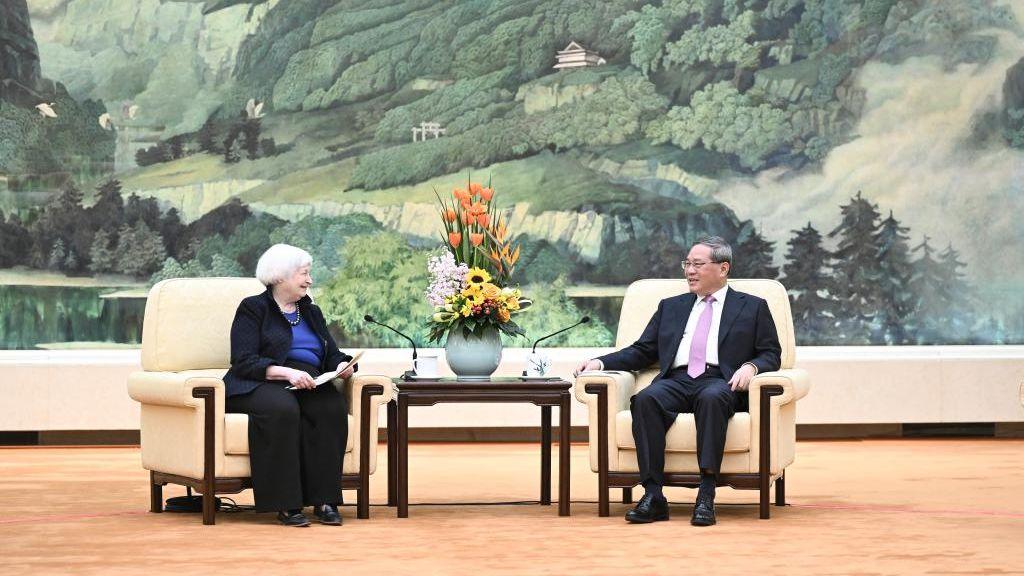Editor's note: CGTN's First Voice provides instant commentary on breaking stories. The column clarifies emerging issues and better defines the news agenda, offering a Chinese perspective on the latest global events.
Amid differences, Beijing and Washington have been talking intensively over the past week. Following the phone call between Chinese President Xi Jinping and his U.S. counterpart Joe Biden, U.S. Treasury Secretary Janet Yellen exchanged views with Chinese high-level officials on issues of common concern in China – her second trip to the country in nine months.
As trade frictions and technology competition are dragging the China-U.S. relationship into a downward spiral, Yellen, an economist arguing against the merits of tariffs, is seen as a voice of reason within the Biden administration. During her China trip, Yellen has, on several occasions, voiced firm opposition to China-U.S. decoupling, warning a bid to decouple from China would be "disastrous."
Against the backdrop of Beijing-Washington intensifying economic, technological and trade competition, Yellen's visit – the latest move to implement consensus that Xi and Biden reached in their phone call last week – is believed to be a signal of stabilizing ties between the world's two largest economies.
"It's a good sign for the U.S.-China relationship when Beijing starts complimenting Treasury Secretary Janet Yellen's chopstick skills," the U.S.-based Politico wrote, adding that the talks over the past week are a "significant development in a tense relationship." "While we have more to do, I believe that, over the past year, we have put our bilateral relationship on a more stable footing," Yellen said.
It is encouraging that both Beijing and Washington have expressed their will to responsibly manage their complex relationship and to cooperate on pressing global challenges.
But will China-U.S. ties really improve?
Whether Washington can transform chumminess into real actions is the key. The Biden administration has repeatedly pledged not to seek to decouple the two economies. But in reality, Washington, under various pretexts including "industrial overcapacity" and "national security," is thinking to expand its crackdown campaign against Chinese firms and products.

Chinese Premier Li Qiang meets with U.S. Treasury Secretary Janet Yellen at the Great Hall of the People in Beijing, capital of China, April 7, 2024. [Photo/Xinhua]
The Biden administration will push China to change an industrial policy that poses a threat to U.S. jobs, Yellen said on Monday as she wrapped up days of talks with Chinese officials. While stressing the need to strengthen economic and trade cooperation between Beijing and Washington, the focus of Yellen's trip was addressing China's "industrial overcapacity." "When the global market is flooded by artificially cheap Chinese products, the viability of American and other foreign firms is put into question," AP quoted Yellen as saying.
Since last year, electric vehicles, lithium batteries and solar cells have become China's "new three" export pillars. Apparently, this has raised the anxiety level of some American officials. Talking up China's "overcapacity," Washington is believed to be creating pretexts for more protectionist policies to shield American companies.
Calling for fair play in business and trade, Washington should at least stop abusing an "overcapacity" pretext to elbow aside leading Chinese firms. As the Chinese Premier stressed in meeting with Yellen, it is hoped that the United States will abide by the basic norms of a market economy including fair competition and open cooperation, refrain from turning economic and trade issues into political or security issues, and view the issue of production capacity objectively and dialectically from a market-oriented and global perspective.
Kicking China out from the global supply chain cannot make American companies more competitive. According to a McKinsey Global Institute report released in January, while China's share of U.S. manufactured imports declined from 2017 to 2020, its share of the value added in goods consumed in the United States actually rose. The rule of the market economy determines the popularity of Chinese products.
Washington's anti-China crackdown campaign will only deepen mistrust between the two countries and shake the fragile stability that has just been established. No matter how chummy American politicians are in talks with Beijing, actions matter.
To remove barriers with the Chinese, Yellen has presented in front of camera her skillful use of chopsticks and explained her "magic mushroom" experience. But to remove the real barriers in the China-U.S. relationship, transforming chumminess into real actions is the key.

 中文
中文



